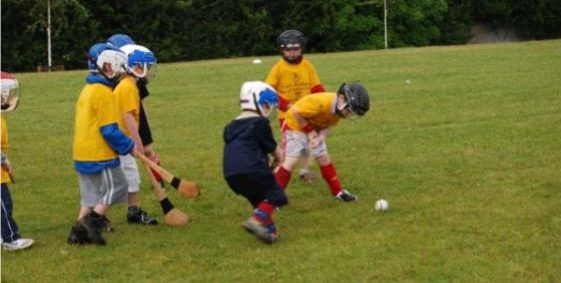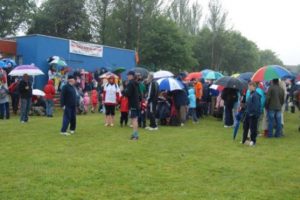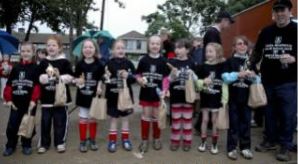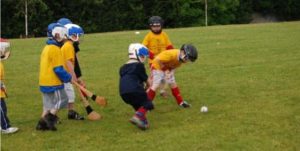
Croke Park Under Dalkey Hill
A personal story of my children and I and their GAA club, Cuala.
This was first broadcast on RTE Radio 1’s Sunday Miscellany on 14 June, 2009 and published in September Sundays in 2013 by New Island.
Studs clicking and scraping on concrete. Hurl’s skewered through helmets and resting on shoulders, like weapons. The day has come. We pile into the car and put on a CD of the Pogues singing ‘The Rocky Road to Dublin’. It is our going into battle song. It is our going to Croke Park song, the one we put on when we approach the Liffey bridge on our way to see the Dubs. On the road I look in the mirror to the back seats where my six year old boy Aaron and seven year old girl Jennifer are preparing themselves for the frey. But today we are not going to Croke Park, because today it is the last day of the mini All-Ireland competition at the Cuala GAA club in Dalkey, south county Dublin.
This is certainly no staunch GAA area. It is no hotbed of gaelic games like Toomevara, or the Gaelteacht in Kerry, or Crossmaglen. But you would not know that if you arrived at the grounds on Hyde Road on a Saturday morning. Cuala has the largest academy in the country and between 9.30 and 10.45 on Saturday mornings hundreds, literally hundreds, of children between 5 and 7 years are there in Cuala’s red.
Cuala has ruined my Saturday mornings that were once the preserve of things like bagels and newspapers.
Cones and posts demarcate the playing fields into stations where the children are put through various drills. I try to do my bit, but confess that sometimes I dodge the eyes of the coaches, like a coward, or a child not wanting to be asked a question by a teacher. Please don’t ask me to do a station! My hope is that I can grab 20 precious minutes on my own in one of the village’s coffee shops. But, often as not, I find myself with ten boys or girls on a drill.
Now, don’t get me wrong with what I am about to say. Cuala is a highlight, indeed sometimes the highlight, of a week-end. But it can seem like a futile exercise. As one attempts to introduce these children to perform the basics of the games a frequent look given back is that they have no idea what you are talking about. Some seem to have no idea why they are there. And when that combines with vain attempts to organise chaos I sometimes ask myself the same question.
‘OK’, they are told, ‘put the hurls down in front of you. Now pick up your hurls up with the hand that you write with.’ One boy picks it up with his left hand. I check with him, just to be sure. ‘Which hand do you write with?’ And he confidently thrusts out the empty right hand.
And it seems that no matter how many times you tell a child to hold a ball, just hold it, they never fail to bounce, throw or kick it – sometimes for remarkable distances that they seem unable to achieve when that is the actual purpose of a drill.
Efforts to grapple with even the most basic of skills force me to wonder on one level how county teams come about? How do some of them get to the stage where 84,000 people will pay money to watch them in Croke Park? On another level it begs the bigger question of how did we manage to send people to the moon? Or split the atom? Or merely invent the toaster? If this is how we start off as a species.
The Cuala academy’s year culminates in the week-long mini-All Ireland held in June. It is the highlight. And that is where we are off to in the car, the Pogues accelerating our pulses as we go to our Croke Park for the day, Hyde Road.
The weather had threatened the final day. Our fears that it would be called off are dispelled when we find we have to park miles away from the club and walk with scores of others, as though we are refugees, through the downpour. Despite the forecast this deluge does not clear, but sits over us like the cloud over the donkey in Winnie the Pooh.
Already drenched we stand in the open under Dalkey Hill and sing the national anthem. Then the children, in teams representing every county except Dublin (which would be deemed to give an unfair advantage to one team) parade round a field flanked with every flag. They follow not the Artane Band, but a lone piper. We all have newfound allegiances to Wicklow, Clare and Waterford.
The matches begin and I find myself exhibiting the first signs of that horrible parent on the touchline. I catch myself, but can’t help it. I shout and roar. Because on the pitches the transformation is, if not astounding, certainly significant. The matches actually have the appearance of matches. There is pattern, there is ebb and flow. Unbelievably forwards play like forwards and backs play like backs. The boys and girls, who had struggled all year, find their feet, their athleticism, their courage. Those who looked at you blankly when given the most basic instruction are now clearing their lines, hand passing the football, striking the sliotar…
They all cheer when their team mate scores. They have a common purpose. They fight for each other. One team has lost all their matches during the week. While it is important to learn to lose, it is also important to learn that you can win. I shout and roar.
I watch Jennifer and Aaron and am quietly grateful for the rain that still lashes into my face.
At then end of the day trophies are given to every player. The photographer uses a flash in the murky afternoon to capture each muddy, smiling, soaking team. And everyone gets a cheer.
Some of these children will certainly go on to play at Croke Park, either at school or underage level. And who knows, maybe one or two will even tog out for the Dubs one day. Of course most will never get to play in headquarters. But what does that matter today? Because for one day, the field under Dalkey Hill has been their Croke Park.








